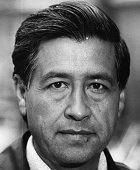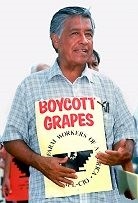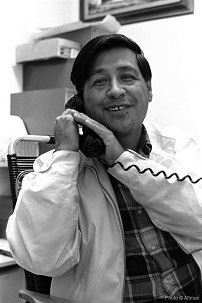 |
| (scvnews.com ()) |
Did you know Cesar Chavez had to undergo a 25 day fast for peace? Cesar Chavez founder of today's NFWA was a hero for not just Latino workers but for all farm hands. Cesar, having little to no education in his background, led a nonviolent cause to improve the impoverished and miserable working conditions an innumerable amount people went through. As his family faced impoverished conditions Cesar was born onto his grandparents farm in Yuma, Arizona 1927. Cesar faced a life full of hardship starting when he left school after completing the eighth grade to help out his family. After working a couple years he realized the conditions were terrible on the farm and decided to peacefully retaliate against the farm owners. This is where he realized his ambitions to improve the working place. He started countless boycotts and fasted various times for the sake of the people who faced the terrible work place. He died at 66 completing most of his goals but not all. After he died he was given Mexico's highest honor, the Aguila Azteca, and given America's highest honor as a civilian, the Presidential Medal of Freedom. Cesar Chavez demonstrated the qualities of a hero with his dedication to his cause, reliability to overcome any situation, and selflessness to sacrifice his time and own body for the sake of the cause. He is therefore a hero.
Chavez felt for the needs of others more than himself, and because of his selflessness he worked non-stop tirelessly to improve the conditions of farm hands. As means of raising awareness for his cause, Chavez" called for boycotts and went on several hunger strikes. It is believed that Chavez's hunger strikes contributed to his death on April 23, 1993, in San Luis, Arizona"(Biography.com). Chavez, knowing the violence would get him nowhere, employed peace tactics and sacrificed his own body to make sure he would win. He knew he hurt himself and did this for others to not suffer. Chavez had problems with violence during the all known Grape Strike so "to avert violence in the grape strike, he undertook a 25-day fast; the fast was broken at an outdoor Mass attended by some 8,000 persons, including Senator Robert F. Kennedy. Chavez also led a 200-mile march from Delano to Sacramento to dramatize the demands of the farm workers"(Encyclopedia of World Biography). Chavez not for a second believed in violence. So instead of violence he sacrificed his body in this 25 day fast. This fast could have completely killed him. His courage and sacrifice is part of the reason why he was so successful in getting what he wanted. Chavez believing that violence was unnecessary took fasts which eventually led to his death, but succeeded because of them.
 |
| (ctorres716.wordpress.com ()) |
Chavez dedicated his whole life to improve the conditions of the farm workers at the time. Because of his dedication and hard work Cesar Chavez succeeded after his death. Chavez hated the way others and himself were treated on the farm so he "dedicated his life to improving the treatment, pay and working conditions for farm workers. He knew all too well the hardships farm workers faced. When he was young, Chavez and his family toiled in the fields as migrant farm workers" (Biography.com). Chavez had gone through the process of being a farmworker when he was young dedicated his life to make sure others did not have to suffer what he went through. He suffered much from his experience and did not want other young people experience it. Chavez hated the way grape farm owners treated the workers so he started the "California table-grape strike, which lasted five years. In 1966, the two unions merged to form the United Farm Workers Organizing Committee (UFWOC) of the AFL-CIO, headed by Chavez. During the struggle to organize the vineyards Chavez initiated an international boycott of California table grapes that brought such pressure to bear on local grape growers that most eventually signed with his union. The boycott ended in September 1970. Soon after this victory, Chavez again employed the boycott strategy, this time against lettuce growers who used non-union labor. Chavez became the first man ever to organize a viable farm workers' union in California that obtained signed contracts from the agricultural industry"(Encyclopedia of World Biography). Chavez with time on his side put time and effort into each problem to overcome them. He dedicated all his time to improve the conditions. He worked tirelessly and in terrible conditions non stop throughout his life. Chavez irked by how countless farm owners mistreated their workers caused him to work non-stop to end the conditions in which many people died from.
Cesar Chavez given any possible task was reliable enough to get through any obstacle he was given. During the national grape boycotts Cesar," In early 1968, Chavez called for a national boycott of California table grape growers. Chavez's battle with the grape growers for improved compensation and labor conditions would last for years. At the end, Chavez and his union won several victories for the workers when numerous growers signed contracts with the union"(Biography.com). Chavez with a miniscule amount of education in his background grew to become a well respected man which made him very reliable. Whatever Chavez needed to do he constantly came up with a plan or tactics to overcome the problem, in this case was to win the signatures of several different farms. When faced with the challenge of getting 200 signatures he "met the challenge head on: within 3 weeks the largest agricultural strike ever to hit California had spread over 180 miles along the coastal valleys. About 7,000 farm workers struck to win recognition of Chavez's UFWOC as their bargaining agent, with the national boycott again used as the weapon." Chavez faced with almost the impossible completed this task in little to no time"(Encyclopedia of World Biography). He consistently knew what to do, with his intellect and influence; he seemingly knew what to do in any situation. This is one of the multiple reasons why he was so reliable. Through thick and thin, Chavez faced every challenge people gave him head on and succeeded in solving each one of them.
 |
| (altmanphoto.com ()) |
Cesar Chavez demonstrated reliability, dedication, and selflessness through his success and life of non stop work, constantly thinking more about others then himself. Chavez worked non-stop his whole life even as a kid. He hated the way the farm owners treated the workers so he sought to improve the conditions. He dedicated the rest of his life to improve the conditions. He found the NFWA and became reliable to overcome any task the farm owners gave him. As violence started to prevail during one of his boycotts he took a 25 day fast which shows his selflessness. It is said he died because of this and is a hero because of this and the rest of his work. He is recognized as a holiday in California. Cesar Chavez inspires me because of his non-stop work to solve a goal in which he took his whole life to overcome the conditions.Chavez still remains a hero to all farm workers because of his passion to help others in terrible conditions. I challenge you to help someone in need because in the end of life we shall be rewarded for what we've done not for ourselves but for others.
Works Cited
"Cesar Chavez." Bio. A&E Television Networks, 2015. Web. 04 May 2015.
"Cesar Chavez." Contemporary Hispanic Biography. Vol. 2. Detroit: Gale, 2002. Biography in
Context. Web. 7 May 2015.
"Cesar Chavez." Encyclopedia of World Biography. Detroit: Gale, 1998. Biography in Context.
Web. 4 May 2015.
"Cesar Estrada Chavez." American Decades. Ed. Judith S. Baughman, et al. Detroit: Gale,
1998.Biography in Context. Web. 1 May 2015.
Deck, A. F. "Cesar Chavez." New Catholic Encyclopedia. Detroit: Gale, 2003. Biography in
Context. Web. 1 May 2015.
Page created on 8/6/2015 12:00:00 AM
Last edited 8/6/2015 12:00:00 AM
